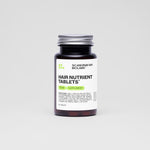top! Don't throw away another dollar on ineffective hair loss treatments until you read this.
If you're watching helplessly as your once luscious locks thin out day by day, you need to know the jaw-dropping truth about simple, natural vitamins for hair loss that could save you from baldness.
Imagine running your fingers through a thick, vibrant mane without a care in the world.
No more hiding under hats or meticulously styling your hair to cover up those embarrassing bald spots.
What if I told you that something as simple as hair loss vitamins could be the answer to your hair loss woes?
Table of content
What are hair loss vitamins?
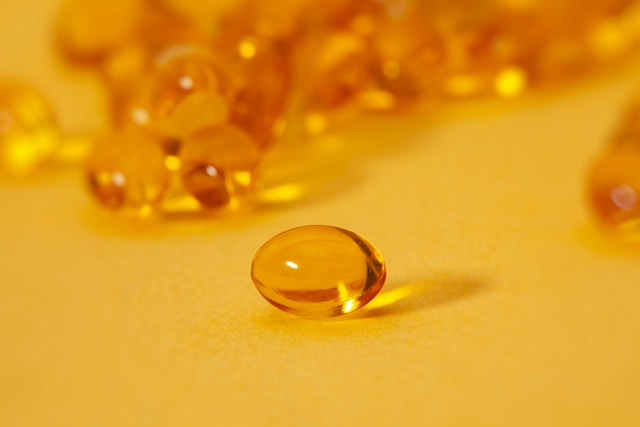
Hair loss vitamins are crafted to replenish your body with essential vitamins and minerals it might be lacking to support hair health. They're packed with vitamins and minerals known to play a key role in maintaining and improving the condition of your hair, potentially reversing hair loss when deficiencies are addressed.
While the idea of a magic pill for hair growth is tempting, it's important to understand the science behind it.
These hair growth supplements often contain a blend of vitamins and minerals such as Biotin, Vitamin D, Vitamin C, Vitamin E, Zinc, and Iron, addressing vitamin D deficiency and supporting the hair growth cycle.
For example, Biotin, a water-soluble vitamin, is celebrated for its role in strengthening hair and nails, while addressing Vitamin D and Vitamin C deficiency is crucial for the production of new hair follicles.
Yet, the effectiveness of these vitamins can vary from person to person, and they're most beneficial when hair loss is due to nutritional deficiencies.
It's always a good idea to approach hair loss holistically, considering diet, stress levels, and overall health in addition to supplementation.
As your leading source for hair health information over the past 4 years, we never compromise on accuracy. When it comes to your health, you deserve information you can truly rely on - and earning your trust is our top priority.
Here's how Scandinavian Biolabs ensures every piece of content meets the highest standards of accuracy and integrity:
- Credentialed Experts: Our reviewers are actively practicing doctors and medical researchers
- Stringent Reviews: Content undergoes rigorous editing by subject specialists and review by a practicing doctor.
- Evidence-Based: We rely on well-established research from trusted scientific sources like peer-reviewed journals and health authorities.
- Full Transparency: Our editorial standards, writer credentials, reviewer credentials, correction process, and funding are all publicly documented.
- Independent Voice: While we do promote products, we operate in a vacuum to business operations. Our main goal is just an unwavering commitment to providing medically-sound guidance.
You can count on Scandinavian Biolabs to consistently deliver the trustworthy health information you deserve. Read our Editorial Standards.
What causes hair loss?
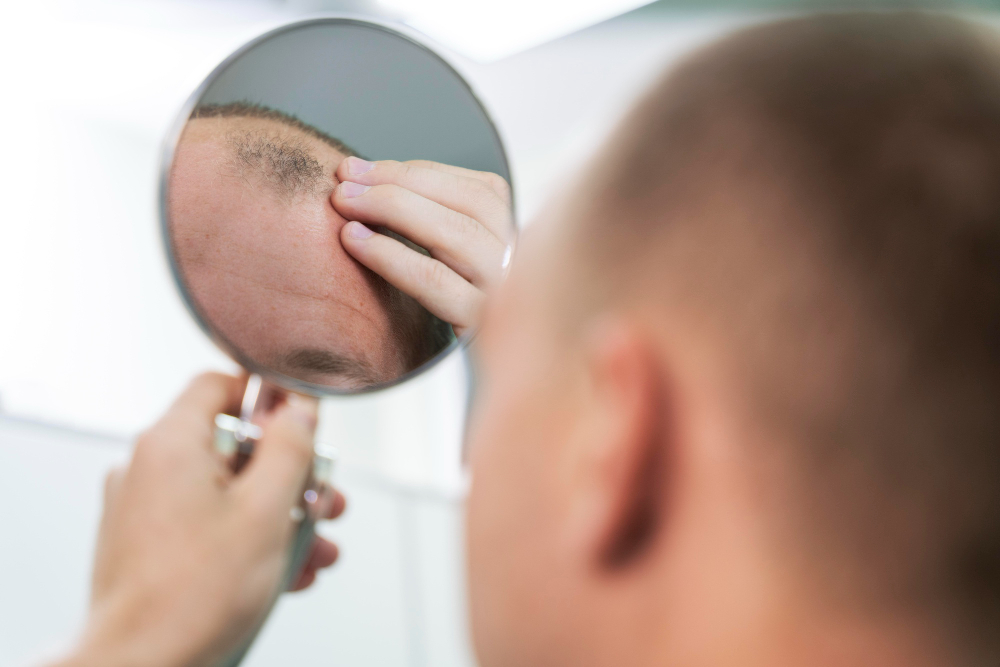
Hair loss is a multifaceted issue that can stem from various causes. While genetics play a significant role in male or female pattern baldness, there are several other factors that can contribute to thinning hair or loss. Here's a closer look at what can trigger hair loss:
- Stress: High stress levels can lead to conditions like telogen effluvium, disrupting your hair's natural growth cycle and causing temporary hair loss. Stress may also trigger alopecia areata, an autoimmune disorder that results in patchy hair loss, and trichotillomania, a compulsion to pull out one's hair.
- Illness: Certain illnesses can cause telogen effluvium, leading to temporary hair shedding.
- Pregnancy and birth: It's common for women to experience increasedhair sheddingpostpartum due to hormonal changes.
- Tight hairstyles: Regularly wearing hair in tight styles can lead to traction alopecia, a form of hair loss caused by constant pulling on the hair roots.
- Weight loss: Sudden or significant weight loss can contribute to hair loss, especially if your diet lacks essential nutrients.
- Vitamin deficiency: Although rare, deficiencies in certain vitamins, particularly iron, can lead to hair loss. Supplementing these vitamins may help if you're deficient, but won't necessarily benefit hair loss from other causes.
Can hair loss vitamins fix hair loss?

Taking hair growth supplements can be beneficial, especially in treating hair loss related to specific vitamin deficiencies, such as folic acid or vitamin C deficiency, by improving hair health. However, there is minimal scientific evidence supporting the idea that supplementing with vitamins can promote hair growth in individuals without deficiencies.
While vitamins play a crucial role in maintaining overall hair health, their ability to treat hair loss depends largely on the underlying cause and addressing specific vitamin deficiencies.
Research indicates that vitamin deficiencies, including those of biotin, zinc, niacin, iron, and folic acid, can contribute to thinning hair, highlighting the importance of adequate vitamin intake.
For instance, a study highlighted the positive impact of zinc supplementation in treating alopecia areata, a condition characterized by patchy hair loss.
Similarly, iron deficiency has been linked to hair loss, especially in women, according to research in the Journal of the American Academy of Dermatology.
However, it's important to note that such vitamin deficiencies are relatively uncommon and usually present alongside other symptoms, emphasizing the need for targeted vitamin intake.
If you suspect that your hair loss is due to a nutritional deficiency, it's essential to consult with a healthcare professional for proper diagnosis and treatment rather than self-prescribing vitamins.
In many cases, hair loss vitamins may offer a supplement to other treatments rather than a standalone solution, and their effectiveness will be limited if the hair loss is not related to a nutrient deficiency.
What vitamins are good for hair growth?

Several vitamins are key players to stimulate hair growth and prevent hair loss. Let's explore the most crucial ones:
Biotin (Vitamin B7)
Biotin supplements are often hailed as the superstar for preventing hair loss and promoting hair regrowth, especially in cases of biotin deficiency. It's essential for producing keratin, a type of protein that forms the foundation of hair strands, making them strong and less prone to breaking.
While biotin deficiencies are rare, those who lack this nutrient may experience significant improvements in hair health from biotin supplements. Adults should aim for a daily intake of 30 mcg of Biotin to support hair health.
Niacin (Vitamin B3)
Niacin plays a critical role in nourishing the scalp by improving blood circulation, which can bring more nutrients and oxygen to hair follicles.
This process is vital for maintaining the strength of the hair shaft and preventing hair thinning and loss. Some research suggests Niacin could be particularly beneficial for treating conditions like Alopecia areata.
Cobalamin (Vitamin B12)
Vitamin B12 is crucial for overall health, including hair growth, as it's involved in cell production. A deficiency in B12 can lead to hair loss among other health issues.
It's particularly important for vegetarians and vegans to monitor their B12 intake, as the most common sources are animal products. Fortified foods and supplements are good alternatives for those on a plant-based diet.
Zinc
Zinc is vital for hair tissue growth and repair. It also helps keep the oil glands around the follicles working properly. Zinc deficiency can lead to hair loss, which is why supplementing with zinc could help if you're not getting enough from your diet.
However, it's important not to exceed the recommended daily limit of 25 mg to avoid adverse effects.
Iron
Iron helps red blood cells carry oxygen to your cells, including hair follicles, which is crucial for healthy hair growth. Iron deficiency, a common cause of hair loss, especially in women, can be corrected with proper supplementation.
The recommended daily iron intake shouldn't surpass 17 mg unless advised by a healthcare provider.
Vitamin D
Low levels of Vitamin D are linked to several forms of hair loss, including alopecia areata and female pattern hair loss. Vitamin D is thought to play a role in the creation of new hair follicles.
Adequate levels can be maintained through diet, supplementation, and sensible sun exposure. The recommended daily intake is 600 IU, but it's crucial to avoid excessive amounts to prevent toxicity.
Vitamin E
Vitamin E, known for its antioxidant properties, can combat oxidative stress and support hair growth, making it an effective vitamin for hair regrowth. A study found that supplementation with Vitamin E could lead to a significant increase in hair growth over several months.
Natural sources include sunflower seeds, spinach, and almonds, with a recommended daily allowance of 15 milligrams.
Vitamin A
Vitamin A is involved in the production of sebum, which keeps the scalp moisturized and hair healthy. However, too much Vitamin A can lead to hair loss, so it's important to find a balance.
Foods rich in beta-carotene, which the body converts into Vitamin A, include sweet potatoes, carrots, and spinach.
How long do hair growth vitamins take to work?
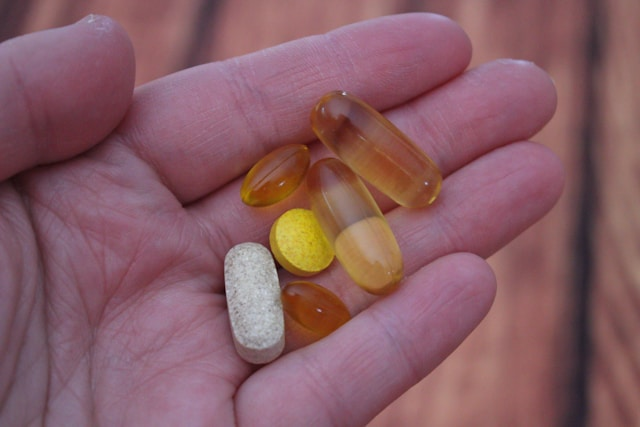
Hair growth vitamins typically require consistent use over a period of time before visible results are noticed, often taking several months to show small improvements. This timeline can vary widely depending on individual factors such as the specific cause of hair loss, dietary habits, genetic predisposition, and overall health.
Hair grows at an average rate of about half an inch per month, and this natural growth cycle means that any intervention, including vitamins and amino acids, will take time to promote hair regrowth and manifest noticeable changes.
For example, amino acids and vitamins that support the hair growth cycle can help new hair grow stronger and healthier, making them essential components of a hair growth supplement, but since hair grows in phases, it can take 3-6 months or more to see significant results.
Additionally, factors like stress levels, hormonal balance, and nutritional deficiencies can also affect how quickly you might see benefits from hair growth supplements.
It's also worth noting that not all hair loss issues can be resolved with vitamins alone, especially if the cause is genetic, such as in androgenetic alopecia. In such cases, vitamins may help support overall hair health but might not stop hair loss entirely.
For the best outcome, it's recommended to approach hair growth holistically, considering both dietary supplements and lifestyle changes, and consulting with a healthcare professional for personalized advice.
What's the best vitamin for hair loss?
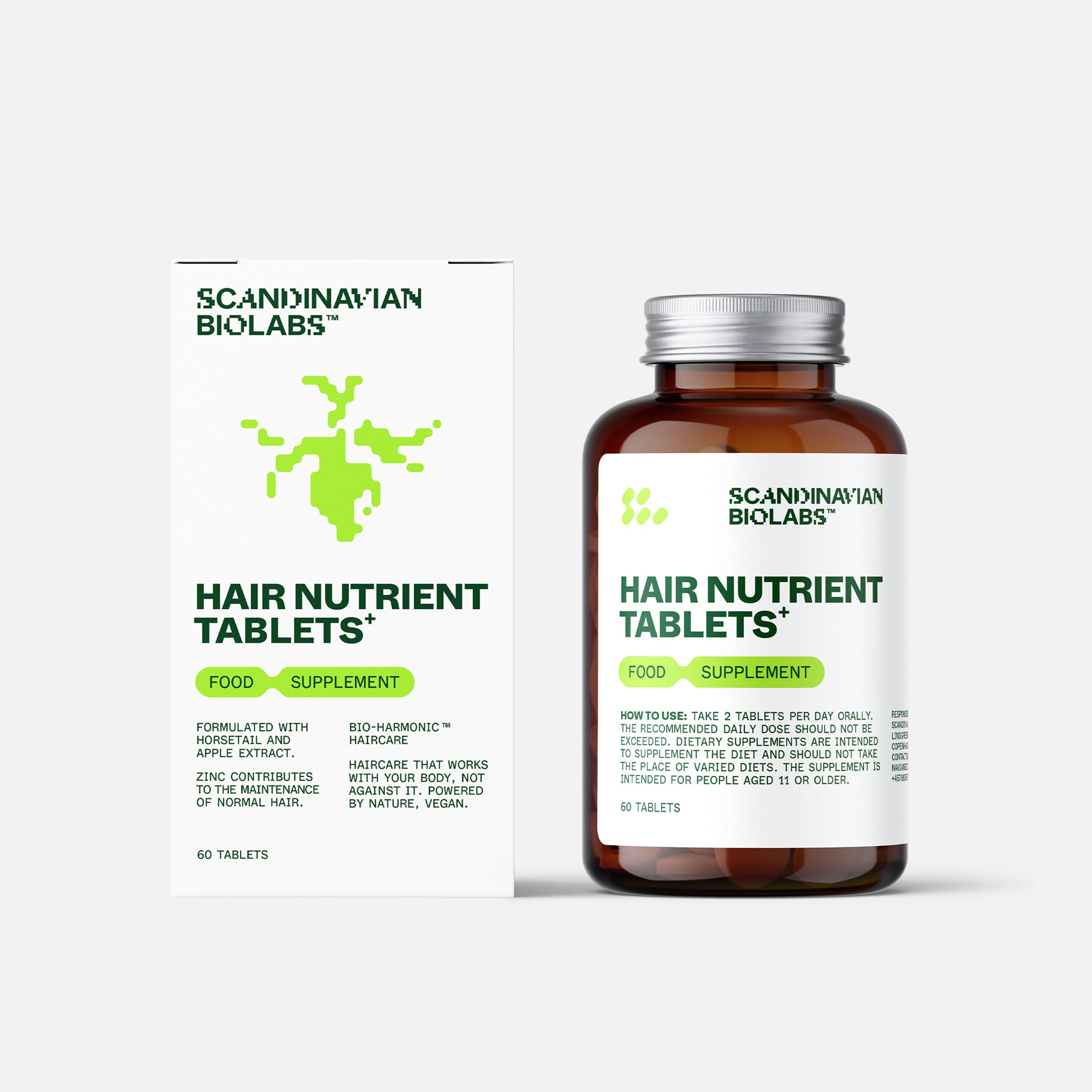
When it comes to the best vitamin for hair loss, Hair Nutrient Tablets from Scandinavian Biolabs stand out as a powerful solution. These vegan tablets are formulated with a blend of apple extract, horsetail extract, and amino acids, providing a concentrated source of essential vitamins and minerals that can help combat hair loss and promote healthy hair growth.
One of the key ingredients in Hair Nutrient Tablets is zinc, which plays a crucial role in maintaining normal hair health and supporting cell division processes. Zinc deficiency has been linked to hair loss, making these tablets an excellent way to ensure you're getting an adequate supply of this vital mineral.
In addition to zinc, Hair Nutrient Tablets contain riboflavin, a B-vitamin that contributes to the protection of cells from oxidative stress, which can damage hair follicles and impede growth.
But what truly sets these tablets apart is the inclusion of horsetail extract, a natural source of silica that contributes to the normal maintenance of hair, skin, and nails. Silica is essential for supporting the structural integrity of hair, making it stronger and more resistant to breakage.
With a 150-day money-back guarantee, third-party clinical testing, and an 'Excellent' rating on Trustpilot, Hair Nutrient Tablets from Scandinavian Biolabs offer a risk-free opportunity to nourish your hair from the inside out. By providing the essential nutrients your hair needs to thrive, these tablets can help reduce hair loss, encourage new growth, and leave you with a fuller, healthier head of hair.
Don't let hair loss continue to undermine your confidence. Invest in Hair Nutrient Tablets from Scandinavian Biolabs and experience the transformative power of targeted nutritional support for your hair.
Conclusion
Navigating the complexities of hair loss requires a multi-faceted approach that considers diet, lifestyle, and the right hair care regimen.
Vitamins and minerals, including vitamin C, which is vital for the immune system, play a critical role in maintaining and enhancing the health of your hair, helping to promote hair regrowth.
Among the various solutions available, the Bio-Pilixin Serum by Scandinavian Biolabs stands out as a potent, scientifically backed option.
Developed with precision and care, it leverages advanced stem cell technology and a blend of effective, nature-inspired ingredients to support hair follicle rejuvenation and encourage healthy hair growth.
With proven results in as little as 45 days, it offers a promising avenue for those looking to enhance their hair's health and vitality.
Remember, while vitamins and specialized hair care products like Bio-Pilixin® Serum can significantly impact hair health, a holistic approach that includes a balanced diet and proper hair care practices is essential for the best outcomes.
FAQs
What is the best vitamin for hair loss?
The best vitamins for hair growth include B vitamins, vitamin C, vitamin E, zinc, and notably, iron, as iron deficiency is one of the most common contributors to hair loss.
Can vitamins fix hair loss?
Vitamins can help reduce hair shedding if you're experiencing a deficiency in key nutrients. However, for conditions like male pattern baldness, vitamins alone may not stop hair loss. Treatments such as Finasteride and Minoxidil are more effective for slowing hair loss and promoting regrowth.
Which vitamin deficiency is most commonly linked to hair loss?
Iron deficiency is a frequent cause of hair loss, impacting the hair growth cycle. Ensuring adequate iron intake can be crucial for those experiencing unexplained hair shedding.
Can B12 deficiency cause hair loss?
Yes, hair loss can indeed be one of the first noticeable symptoms of a vitamin B12 deficiency. This condition can also manifest through other signs such as fatigue, weakness, and a general lack of energy, which are unrelated to hair but indicate a possible shortfall in B12.
Can B12 regrow hair?
While a deficiency in vitamin B12 can contribute to hair loss, there's no substantial evidence to suggest that B12 supplementation will improve hair growth in individuals without a deficiency. Nonetheless, maintaining adequate levels of vitamin B12 is crucial for overall health. Foods like meat, dairy, and other animal products are rich sources of vitamin B12.
Can I take vitamin D and B12 together?
Yes, you can safely take vitamin B12 and vitamin D together. These vitamins fulfill different roles in your body and complement each other's functions. However, it's important to avoid excessive intake of either vitamin to prevent potential side effects.
References
https://www.ncbi.nlm.nih.gov/pmc/articles/PMC6380979/Read more:
- 11 Best Hair Loss Shampoo Of 2024 In Hands-On Test
- Hair Growth Treatment Safety: Expert Guidelines & Side Effects
- Finasteride: Before And After Results (With Pictures)


